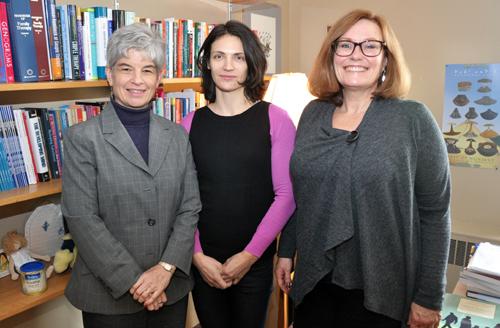
If you or someone you know is struggling with a problem, the Couple and Family Therapy Centre (CFT) can help. The centre is staffed by interns working toward their M.Sc. in couple and family therapy. The program is accredited by the Commission on Accreditation for Marriage and Family Therapy Education.
Having operated at U of G for more than 30 years, the centre now sees an average of 600 clients per year, including couples, families and individuals. In their first term of the two-year program, interns are trained in counselling techniques and begin to see clients in their second term. Their last semester is spent in a community placement. By the time they graduate, the interns will have spent 500 hours in client sessions under the supervision of clinical faculty.
“It’s excellent training,” says Prof. Lynda Ashbourne, Department of Family Relations and Applied Nutrition (FRAN), who graduated from the program. “Here we’re able to control that training and make sure that it’s done in a way that benefits both the interns and the clients. I think that’s really valuable.” Unlike role playing, she adds, helping real clients with real problems is “the best way to learn how to be a therapist.” Graduates of the program are sought after by community agencies because of their ability to work with clients as soon as they graduate.
“Therapy can be a phenomenal resource to help people live the lives they are hoping to live and overcome the challenges that they are facing in their lives,” says Matthew Stevenson, M.Sc. ’12, who trained as a therapist at CFT. For his community placement, he worked at Trellis Mental Health on the child and adolescent team.
Stevenson was inspired to become a therapist because he was interested in how interpersonal relationships can affect an individual’s life. Meeting with his first client was a nerve-racking experience, he admits, but the support he received from faculty and classmates helped him help his clients.
“The most rewarding part about being a therapist is witnessing the resilience of other people and their ability to overcome problems in their lives,” he says. “That is incredibly moving and incredibly powerful.”
All of the centre’s clients are community members, says Katherine Tomkinson, CFT manager and also a graduate. “We tend to see clients who are somewhat harder to serve. They face a number of systemic issues,” including family violence, poverty and addictions. The centre charges a sliding fee scale based on the client’s financial situation. People receiving social assistance pay between $5 and $10 per session; the maximum fee is $75 per session.
Seeing a therapist-in-training may be more beneficial to the client than seeing a practitioner in the community, adds Prof. Olga Sutherland, FRAN. “Because those are their first clients, they invest a lot of time thinking and reflecting about each family and discussing with their supervisors.”